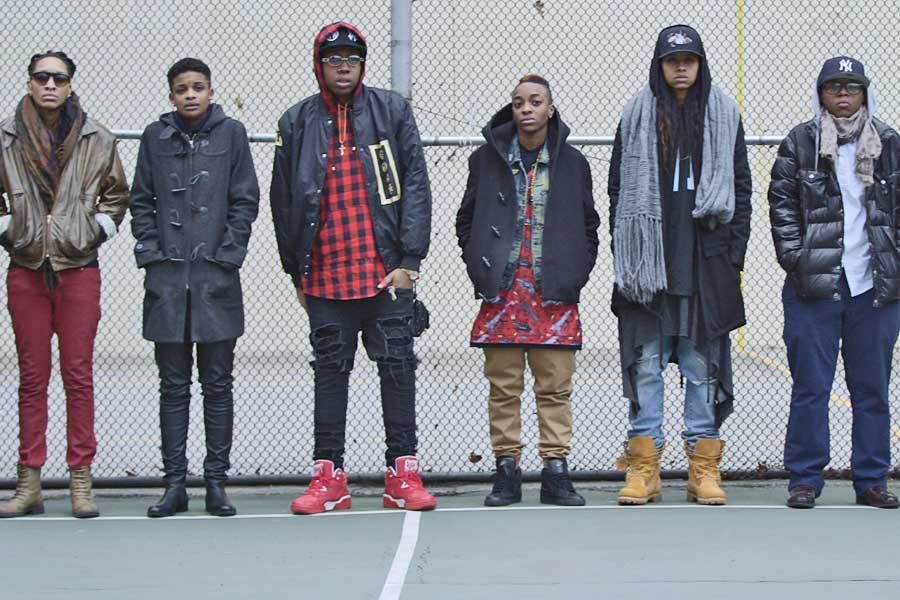“The Same Difference,” screening next weekend at Lightbox Film Center, is a provocative documentary about conflicting attitudes in the African-American lesbian community.
The hour-long film, directed by Nneka Onuorah, opens with a quote from Audre Lorde about “recognizing, accepting and celebrating” our differences. But as the film shows, there is controversy when “studs” express themselves in ways that go against gender rules.
Onuorah explores several “rules” of the African-American lesbian community by showcasing the people who break them.
Kellz, aka King Kellz, is an exotic dancer who identifies as a stud, but wears weaves in her hair. This “half-woman/half-man” look upsets members of the community who feel studs should present as masculine only.
Likewise, actor Felicia “Snoop” Pearson (“The Wire”) does not want to be boxed into one gender identity. While many folks see her as a “thug” because of her braids and masculine appearance, she does an about-face and tries to both dress and act more feminine. One of the most enjoyable and amusing scenes in “The Same Difference” has her learning to walk in heels in an apartment hallway.
Another issue raised in the film has to do with “studs being with studs,” as some members of the lesbian community object to two masculine women being in a relationship. Nykyia and Mickey, two Atlanta-based studs who are a couple, explain what they appreciate about dating each other. They also try to understand why a mutual friend of theirs is so taken aback by their relationship and displays of affection.
This segment leads to a discussion of gender roles in the white and black lesbian communities and how they are both similar and different. Butch lesbian icon Lea DeLaria (“Orange Is the New Black”) is interviewed for the film and even cracks a joke about the issue; there is truth in her humor, even if not everyone shares her point of view.
“The Same Difference” considers why there is such a strong reaction to gender and sexuality roles in the African-American community especially, and one answer the film suggests is that established heterosexual roles (i.e., parents) provide guides for behavior. This leads to another issue raised in the film, which concerns studs, like interviewee Jordan, who is pregnant and yet presents as masculine. Jordan explains how her wife was unable to conceive, and that while they considered adoption, she agreed that she would try to get pregnant first. When Jordan is successful, her pregnancy generates considerable hatred from some close-minded members of her African-American lesbian community.
A phone call Jordan has with DAPS, a woman who has responded negatively to Jordan’s pregnancy, leads to some eye-opening revelations. The most salient among them is that the LGBT community faces considerable discrimination already, so it doesn’t need more from its own community.
This message is at the heart of Onuorah’s film, and while she has a Greek Chorus of interviewees expressing their opinions about the various topics raised, “The Same Difference” is best when the subjects simply present themselves as who they are.
It is moving to see Kellz talking with her preteen daughter, encouraging the girl to be herself. This echoes a later scene where a woman praises Kellz for holding on to her individuality within a community at odds.
Another subject, Mercedes, a massage therapist, expresses her concerns about coming out as bisexual, which is also portrayed as taboo in the African-American community. She struggles with telling her friends about her months-long relationship with a man and worries about not fitting in.
The emotions that Mercedes, Kellz, Felicia and Jordan — the film’s key subjects — express are all heartfelt, and viewers will be squarely on their side as they each confront ignorant and unsupportive attitudes about gender and appearance.
Onuorah peppers these segments with terrific music from stud musician Jessica Betts, who sings about “only having to love yourself,” and Philadelphia poetess Kai Davis, who talks about the hypocrisy in the lesbian community. Davis briefly discusses the stigmas against femininity and the reverence towards masculinity when it comes to masculine-presenting women.
On that same point, Nor, another interviewee, explains that while she identifies as a stud, she also likes to wear makeup. She claims she lost her “gay card” because she put on makeup.
It is admirable that Onuorah wants to address these issues dividing the African-American lesbian community. Her film creates a necessary dialogue to help open — if not change — minds. Her main subjects eloquently express their thoughts and opinions, and watching these role models be true to themselves is rather inspiring.
“The Same Difference” screens at 7 p.m. June 16 at Lightbox Film Center, 3701 Chestnut St. For more information, visit www.ihousephilly.org/arts.
